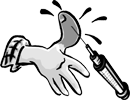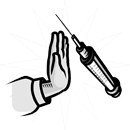Preventing Injury and the Spread of Blood-Borne Diseases
Occasionally there are reports that someone has come across a discarded needle while at the beach, park or during a community cleanup. While it doesn't happen often, it is important that the needle be safely collected and disposed of by an adult.
Most people who use needles for medication have safe disposal containers. But sometimes needles are not handled properly. This creates a safety risk for others.
What are blood-borne diseases?
HIV, Hepatitis B and C are diseases that are carried in the blood. These diseases are not spread through everyday contact. They can be spread through unprotected sex, from a pregnant woman to her unborn baby, and through blood and blood products.
If needles are shared, individuals are exposed to the blood of another person. If a person is infected with Hepatitis B or C or HIV there is a risk of the disease being spread.
What is the risk of disease from a needlestick injury?
The risk of becoming infected after being stuck by a needle is very low. The fact that only a small percentage of our population is infected with these diseases reduces the risk further.
What we want to do is prevent these accidental injuries.
 What can I do to help children understand what to do if they find a needle?
What can I do to help children understand what to do if they find a needle?
Teach children these simple rules:
- If you find a needle do not touch it. Used needles can be dangerous and can carry germs and other things that might make you sick.
- Tell an adult where the needle is.
- If you are hurt by a needle, tell someone. You will need to see a doctor right away.
 What is the correct way to collect and dispose of a used needle?
What is the correct way to collect and dispose of a used needle?
- Pick the needle up carefully - do not touch it with your bare hands. If you have gloves, wear them, or use a heavy cloth. If tongs are available, use them to pick up the needle.
- Hold the needle tip away from you, be careful not to prick yourself.
- Place the needle in a can or plastic container with a lid, place needle tip down into container, seal securely.
- Call or bring the container to the health unit. You may also take the needle to the police, hospital emergency department, or a hazardous waste disposal site near you.
What should I do if a needle puncture does happen?
If a needle does break the skin, let the cut bleed freely. Wash the area well with soap and water and apply an antiseptic like rubbing alcohol or peroxide. Visit the doctor right away.
The risk of getting a disease is low, but each situation needs to checked out thoroughly. You may be advised to have blood tests or get immunized, depending on the situation.